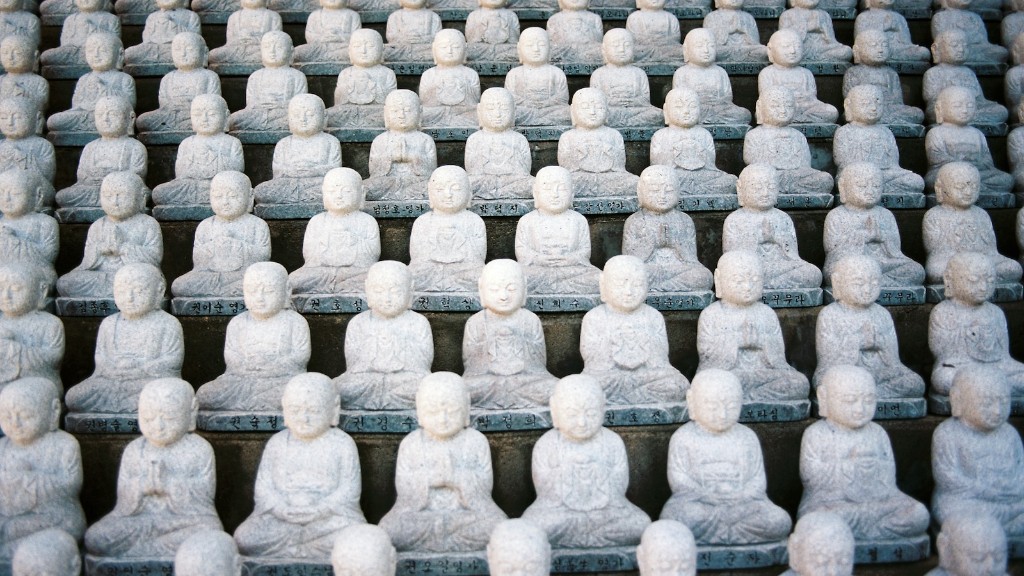Buddhism is a spiritual tradition that originated in India. It is based on the teachings of Siddhartha Gautama, who is also known as the Buddha. The Buddha taught that the way to end suffering is to live in a way that is in line with the Four Noble Truths and the Noble Eightfold Path. These teachings emphasize the importance of ethical conduct, mental discipline, and wisdom.
Buddhism is founded on the Four Noble Truths, which are that life is suffering, that suffering is caused by desire, that suffering can be ended by eliminating desire, and that this can be accomplished by following the Eightfold Path. These truths are intended as a practical guide to Buddhist life and liberation, rather than as a metaphysical or theological statement. Other important Buddhist teachings include the Three Jewels (Buddha, Dharma, Sangha), the Five Precepts, and the significance of Nirvana.
What are 5 basic beliefs of Buddhism?
The Five Precepts are a set of guidelines for living that are traditionally practiced by Buddhists. The precepts are: refrain from taking life, refrain from taking what is not given, refrain from the misuse of the senses, refrain from wrong speech, and refrain from intoxicants that cloud the mind.
Buddhism is a religion that is based on the teachings of Siddhartha Gautama. The main principles of this belief system are karma, rebirth, and impermanence. Buddhism teaches that we are all reborn into different lives based on our karma, or actions in our previous lives. This cycle of rebirth is called samsara. Buddhism also teaches that everything is impermanent, including our thoughts, feelings, and bodies.
What are Buddhist values and beliefs
The main Buddhist values are love, wisdom, goodness, calmness and self-control. Buddhists believe that people should try to end suffering; all things should be seen as having no self or essential nature.
The Noble Eightfold Path is a path to enlightenment that was laid out by the Buddha. It is a path that can be followed by anyone, regardless of religion or background. The steps of the path are Right Understanding, Right Thought, Right Speech, Right Action, Right Livelihood, Right Effort, Right Mindfulness and Right Concentration. Each step is important in its own right, and when followed, can lead to a life of peace and happiness.
What is one of the most important beliefs in Buddhism?
One central belief of Buddhism is often referred to as reincarnation — the concept that people are reborn after dying. In fact, most individuals go through many cycles of birth, living, death and rebirth. A practicing Buddhist differentiates between the concepts of rebirth and reincarnation.
Buddhism is a faith that was founded by Siddhartha Gautama (“the Buddha”) more than 2,500 years ago in India. With about 470 million followers, scholars consider Buddhism one of the major world religions.
Buddhism teaches that the way to end suffering is to live in a way that minimizes desire and attachment. Buddhists seek to attain this goal through practices such as meditation and ethical living.
There are many different schools of Buddhism, each with its own distinct beliefs and practices. However, the core teachings of Buddhism are shared by all schools.
If you’re interested in learning more about Buddhism, there are many resources available online and in libraries. You can also visit a local Buddhist temple or center to speak with a monk or nun.
What is Buddhism lifestyle?
The ‘Middle Way’ is an important concept in Buddhism, and refers to the path of moderation between the extremes of self-indulgence and self-mortification. The goal is to find a balance in one’s life, and to avoid extremes which can lead to suffering. The Noble Eight-fold Path is a guide to help individuals achieve this balance, and to live a more fulfilling and meaningful life.
Alcohol use is discouraged in Buddhism as it can lead to carelessness. Buddhist beliefs would therefore have a significant impact on alcohol use.
What are Buddhist beliefs about death
According to Buddhist teaching, life and death are part of a continuum. Consciousness (the spirit) continues after death and may be reborn. Death can be an opportunity for liberation from the cycle of life, death and rebirth.
Nirvana is the goal of Buddhism and is believed to be attained only with the elimination of all greed, hatred, and ignorance within a person. Nirvana signifies the end of the cycle of death and rebirth.
What do Buddhists pray for?
When we pray to the buddhas, bodhisattvas, and spiritual masters, we are asking for their help in invoking the enlightened qualities of our own heart and mind. We are asking for their help in letting go of the ego’s resistance to humility. By doing this, we are able to open ourselves up to the possibility of our own enlightenment.
Buddhism is mostly focused on one’s spiritual liberation and not a theistic religion. The Buddha himself had rejected the idea of a creator god. However, some Buddhist philosophers argue that belief in an eternal god is a distraction for humans seeking enlightenment.
What are the 10 rules of Buddhism
The Ten Grave Precepts are a set of moral guidelines for Buddhist practitioners. They are based on the belief that all life is interconnected, and that by treating others with compassion and respect, we can create a more peaceful world. The precepts encourage us to live in a way that minimizes harm to others, and to ourselves.
Buddhists believe in the power of worship and prayer to connect with the Buddha and to gain merit. They often worship at temples or monasteries, where they can meditate and pray in peace. Some Buddhists also set up shrines at home, so that they can worship in private. When worshiping, Buddhists may offer fresh flowers, lights, and lamps, or burn fragrant incense. These acts show respect to the Buddha and are believed to make merit for the devotee.
What are the 2 main beliefs of Buddhism?
The four noble truths are the cornerstone of Buddhism and remain common to all schools of the religion. They state that existence is suffering, that suffering has a cause, that there is a cessation of suffering, and that there is a path to the cessation of suffering. The four noble truths provide a framework for understanding the human condition and for liberation from it.
There are some similarities between Jesus and Buddhism, such as the belief in reincarnation. However, there are also some significant differences between the two religions. For example, Buddhism does not believe in a personal god, while Christianity does.
Conclusion
Some of the central beliefs of Buddhism include the Four Noble Truths, Karma, and the cycle of Samsara.
Buddhism beliefs are based on the Four Noble Truths, which are that suffering exists, that suffering has a cause, that suffering can be ended, and that there is a path to the end of suffering. The Noble Eightfold Path is that path, and it is the Buddha’s teachings on how to end suffering.



